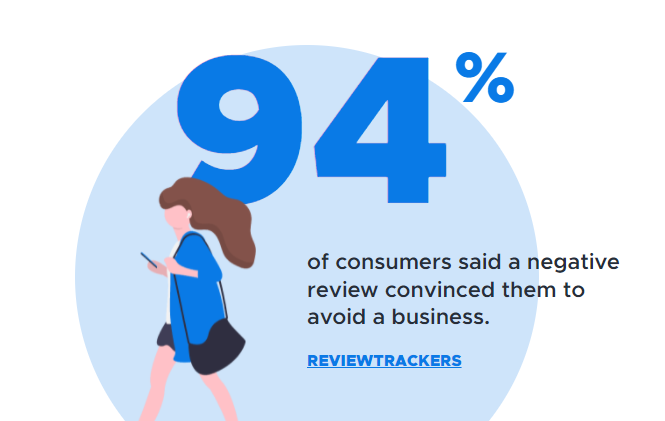What is Review Gating, and Why is it Dangerous?
Dec 7, 2021
Table of Contents
What is Review Gating?
How do Businesses "Gate" Reviews?
Why is Google Against Review Gating?
Dangers of Review Gating
Removal Of All Your Reviews
Portrays an Inaccurate Picture Of Your Business
Trust Can Be Lost
Benefits of Not Gating Reviews on Google Business
The Right Way to Request a Review on Google Business
Review Gating on Yelp
Conclusion
With more and more local businesses going online, it can be challenging to stand out from the competition. Because of this, business owners and marketers try to do everything in their power to garner the attention of new and returning customers.
One of the ways how businesses can differentiate themselves is through the use of getting authentic reviews from customers. Reviews play a pivotal role in a new customer's search for a local business to try out, whether that be a new barbershop for a men's haircut or a different Italian restaurant for a monthly date night.
In fact, one study reveals that 79% of customers trust online reviews as much as personal recommendations from friends and family. According to ReviewTrackers, "94% of consumers said that a negative review convinced them to avoid a business".
As a result, many local business owners and marketers feel that they've got to manipulate or influence online reviews in favor of their business, with the hopes of ranking higher in the search results and attracting more clicks from web users.
This is also known as "review gating". In this article, we will share what it is, why you should avoid review gating and the right way to get reviews instead.
What Is Review Gating?
Review gating is a process whereby a business, local or online, only encourages customers that have had a pleasant buying experience to leave a publicly visible Google, Yelp or TripAdvisor review.
By first getting feedback from a customer in private, a business can do one of the following things:
- Send a customer who has had a good experience to a form where their positive review will be publicly visible.
- Direct customers who have had a negative experience to a form on their website where they can privately add their reviews so that they aren't visible to the public.
You can think of review gating as "cherry-picking" the reviews that fit your fancy.
Both of the above practices fall under review gating and are in direct violation of Google's Review Policy:
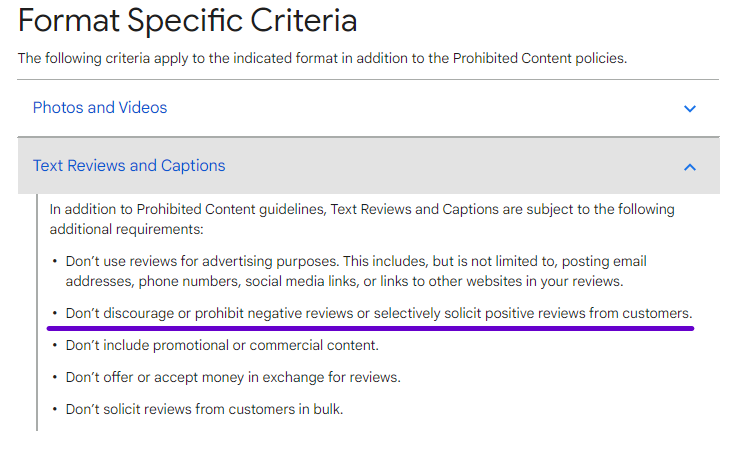
If you want genuine and authentic reviews on Google Business, then you've got to ask each and every customer for a review, instead of only asking customers who you think will leave positive feedback.
How Do Businesses "Gate" Reviews?
Businesses can practice review gating by making use of software that adds a "qualifying" question to each review request. This question usually goes like, "Were you satisfied with our service? Yes/No".
If the customer answers "Yes", then he/she is directed to the review site to share their feedback.
Another way to practice review gating is by offering incentives in exchange for positive reviews. The problem with this is that it doesn't reflect real customer experiences because customers may leave a biased review in exchange for a discount or some form of reward.
Google has made it clear that offering incentives in exchange for reviews violate their review policy, as indicated in the below screenshot:
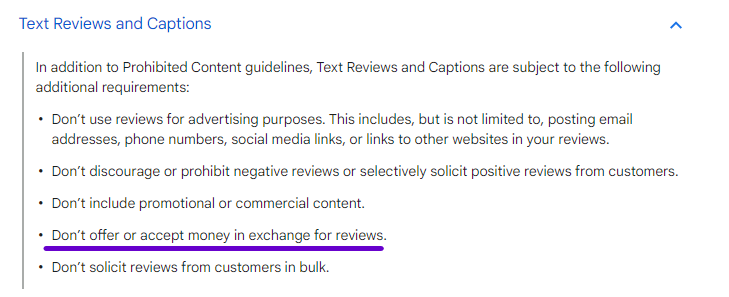
Why Is Google Against Review Gating?
Now, you may be wondering why Google is against review gating. Surely there's nothing wrong with only showcasing your business' amazing customer experiences, services, and products. right?
A major part of Google's mission is to provide internet users access to an online ecosystem that is safe and trustworthy. When business owners and/or marketers practice review gating, they are actively manipulating the online review system by creating a false representation of their business.
The entire premise behind Google's online reviews is to give web users or potential customers access to genuine customer experiences from individuals who've had previous interactions with a business.
Dangers Of Review Gating
You may be thinking that receiving only positive online customer reviews is a good thing, but actually, it isn't. Here are the dangers of practicing review gating.
Removal Of All Your Reviews
The first and potentially the most significant reason why you should avoid review gating is that Google can remove all of the reviews on your Google Business profile - yes, even the reviews from before you started practicing review gating.
You may be wondering, "How will Google know if I practice review gating?"
Well, I think it's safe to assume that Google's algorithm is smart enough to flag a consistent stream of 5-star reviews.
Imagine losing all of your customer reviews just because of one silly practice that goes against Google's Review Policy. Review gating just doesn't seem that appealing now, does it?
Portrays an Inaccurate Picture Of Your Business
Not only do you risk losing all of your Google reviews when practicing review gating, but you also paint an inaccurate picture of your business.
Just like any mother who doesn't want to believe that their child can't be great at everything, it's easy for business owners to believe that their business(es) can't make any mistakes.
As the saying goes, "If something seems too good to be true, then it usually is." When you practice review gating, you're basically saying that "my business is so great and we don't make any mistakes."
And we all know that no business is perfect.
By having only positive reviews, you create a false illusion that your business will always provide amazing products, services, and customer experiences.
Trust Can Be Lost
Review gating leads to a disproportionate amount of positive reviews to negative reviews. This can give new customers a "sniff in the nose" and you risk losing their trust in all your online reviews.
Customers will only trust genuine, authentic reviews of your business.
Negative reviews actually allow you to prove that your reviews are based on real-life customer experiences. This leads to increased trust in all your reviews as a whole.
Benefits of Not Gating Reviews on Google Business
According to a study done by GatherUp, by not gating reviews on Google, businesses saw a 68% increase in the number of reviews that they've received. The same study revealed that the impact of not gating reviews didn't have much of a negative impact on rating scores (star ratings).
The conclusion of this study reveals that gating has almost no benefits.
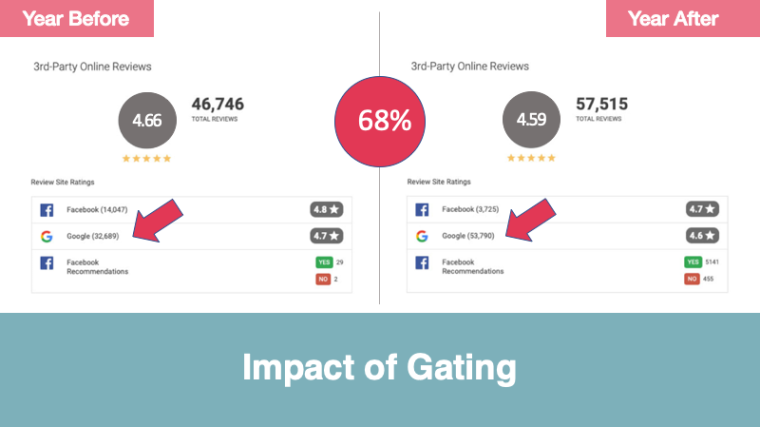
These insights are important for local rankings. Google has stated that increased review volume and positive ratings can improve a business' local rankings:
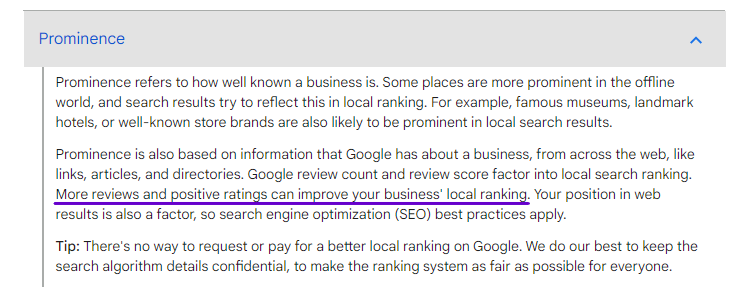
Knowing that Google review gating can adversely affect your local SEO rankings by limiting the volume of reviews your business can receive, would you still want to continue practicing it?
The Right Way To Request A Review on Google Business
So then, seeing as not gating reviews has such a little impact on overall scores and an increase in reviews, how should you go about asking for reviews on Google Business?
Local businesses like hair salons, restaurants, cleaners, and car dealerships should ask each and every customer for a review immediately after they've interacted with the business, while the customer(s) are still on-premises.
The reason for this is that people are less likely to leave a negative review when asked face-to-face.
Review Gating on Yelp
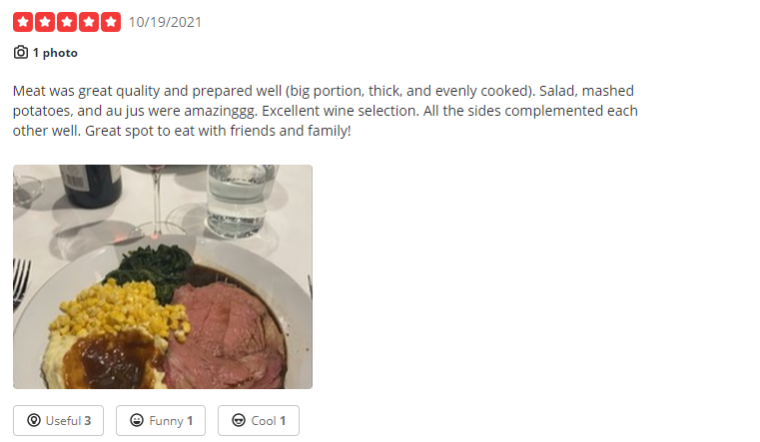
Yelp has a very strict review policy. Yelp states that local business owners should not ask customers for a review on their platform.
According to Yelp, their recommendation software is "designed to highlight reviews from people who want to share genuine experiences - without being asked or tempted."
Here are 4 more things to consider when it comes to Yelp's review policies:
- Business owners shouldn't incentivize customers to leave a review.
- Local business owners shouldn't ask anyone to review their business.
- Business owners shouldn't get staff to compete to collect reviews.
- It's against Yelp's policies to ask for reviews after requesting customer feedback in surveys and contact forms.
This basically means that business owners should strive to create memorable customer experiences without expecting a review in return.
Conclusion
Review gating on Google is considered a violation of Google's online review policy. And besides, with almost no benefits, why would you gate reviews and risk losing all your Google reviews and customer's trust just to portray that your business is "perfect"?
If you encounter a negative online review of your business, it's the perfect opportunity to win back that customer and showcase your amazing customer service and your business' determination to ensure all customers are satisfied after having dealt with your business.
Remember, the entire premise behind Google reviews is so that new and returning customers can get a genuine idea of what customers have experienced beforehand.
